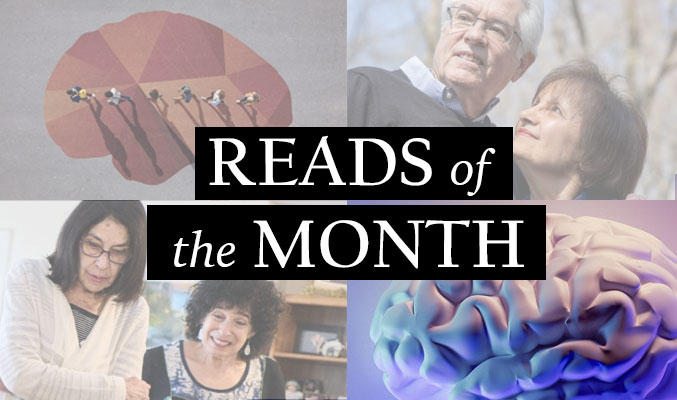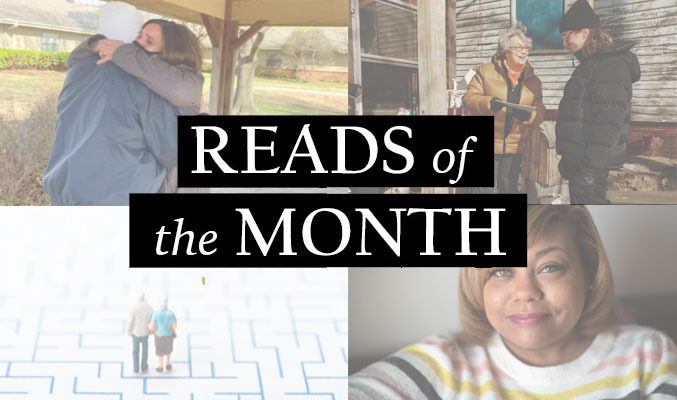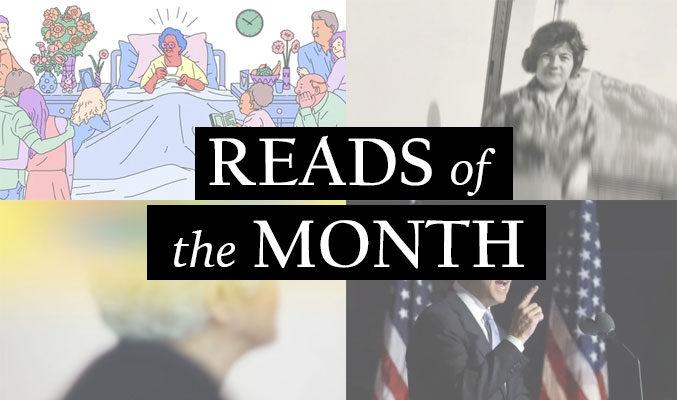In case you missed them, our editors and contributors round up their most recommended reads from the month of April in Being Patient Reads of the Month.
Wall Street Journal: The Importance of Friendship for Alzheimer’s Patients, April 19
Writer Clare Ansberry’s piece in the Wall Street Journal shines a light on the importance of sustained friendship through an Alzheimer’s diagnosis, as demonstrated through two friendships: Abbe and Judy, Arthena and Shaun. Each pair has been friends for over 30 years, with countless milestones shared. When Judy and Arthena were diagnosed with Alzheimer’s, their respective friend continued to stay by their side, adjusting old habits in order to stay better connected. With loneliness being associated with a 40 percent increased risk of dementia, this piece shows the high stakes involved in maintaining friendships. It also provides tips on how to adapt to the changes in dynamic that are inevitably brought on by the disease. Each woman’s resolve and commitment to the other shows the true colors of their ever-lasting friendship. “I lost my close friend that she was. I lost that Judy,” says Abbe. “I have another Judy, and I just want to do my best to keep her happy.” –Genevieve Glass
U.S. News & World Report: Your Alzheimer’s Disease Risk May Depend on Where You Live, April 16
Researchers at the University of Wisconsin-Madison School of Medicine and Public Health recently published data from a 10-year longitudinal study testing the hypothesis that residing in a highly disadvantaged neighborhood is associated with neurodegeneration and cognitive decline. As the study progressed, researchers found greater brain shrinkage and poorer brain function in those living in the most disadvantaged neighborhoods. Dr. Amy Jo Kind, director of the Health Services and Care Research Program at the University of Wisconsin and corresponding author of the Neurology article, told U.S. News & World Report, “The findings in our study not only inform opportunities for improved clinical action, but also potentially provide a pathway towards broader social policy actions to address the core inequities that can result in (Alzheimer’s disease) disparities.” –Alicia Barber
Alzforum: Clinicians from Developing Nations Discuss Dementia in Their Populations, April 2
For Alzforum, Helen Santoro reports on the hopes and challenges of providing dementia care for people living in developing nations. Low- and middle-income countries account for roughly two thirds of all dementia cases, and by 2050, Santoro writes that the majority of the world’s older adults will live in developing countries. However, stigmatization along with the lack of education and access to health care continue to be roadblocks for patients and clinicians. Experts express their optimism in the advent of diagnostic tools such as blood tests in improving and expanding care — but they also share insights of the accompanying challenges. “[Lifestyle interventions] are the goals of our care at the moment, as that would help prevent dementias according to the Lancet Commission on dementia,” said one healthcare provider, Adesola Ogunniyi from University College Hospital, in Nigeria. –Nicholas Chan
The New York Times: They Have Alzheimer’s. This Clinical Trial May Be a Last Hope, April 22
In Gina Kolata’s recent article for the New York Times, three participants diagnosed with Alzheimer’s share their reason for volunteering to be a part of Eli Lily and Company’s new clinical trial, which aims to test out a drug, donanemab, that can potentially slow down Alzheimer’s progression. These participants each share a common feeling of hope and perseverance. Despite the changes they face with the disease, they are still doing everything they can to slow its progression. “Our main incentive is to help other people and to move research forward,” the spouse of one trial participant said. “There wouldn’t be a COVID vaccine if people had not volunteered.” –Queenie Lacaben





